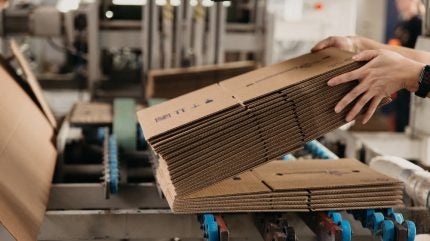
Selecting the right packaging manufacturer is a strategic decision that can directly influence product quality, brand perception, supply chain efficiency, and sustainability outcomes.
Whether you’re sourcing packaging for consumer goods, industrial products, or specialised applications, aligning with the right manufacturing partner ensures your packaging solution meets functional, commercial, and regulatory requirements.

Discover B2B Marketing That Performs
Combine business intelligence and editorial excellence to reach engaged professionals across 36 leading media platforms.
As packaging professionals navigate an increasingly complex landscape of materials, technologies, and sustainability targets, a thorough understanding of what manufacturers offer—and how they differ—is critical.
Defining the role of a packaging manufacturer
Packaging manufacturers are responsible for producing a diverse array of packaging products, from corrugated shipping cartons and thermoformed trays to flexible pouches and rigid containers.
Depending on their specialisation, manufacturers may offer off-the-shelf packaging formats, highly customised solutions, or a combination of both.
Many manufacturers go beyond simple production.

US Tariffs are shifting - will you react or anticipate?
Don’t let policy changes catch you off guard. Stay proactive with real-time data and expert analysis.
By GlobalDataIntegrated design and prototyping services allow businesses to develop packaging that aligns with both brand objectives and functional needs—whether it’s shelf appeal, transit protection, or extended shelf life. CAD modelling, 3D sampling, and small-batch testing enable refinement early in the process, reducing time-to-market and ensuring product–pack compatibility.
Manufacturers often support value-added services including multi-pass printing, lamination, barrier coating, and finishing enhancements such as embossing or UV spot varnishing.
These capabilities are particularly important in competitive retail sectors, where visual impact and tactile differentiation influence consumer choice.
For professionals involved in packaging development, sourcing directly from a manufacturer facilitates better oversight of materials, performance specs, and production consistency—vital factors in regulated industries like pharmaceuticals, food, and cosmetics.
Key benefits of working directly with a packaging manufacturer
Working with a qualified packaging manufacturer delivers measurable value across multiple areas:
- Quality control and consistency: Direct relationships allow for better oversight of raw material sourcing, process standards, and quality assurance protocols. Manufacturers often provide certificates of compliance and test data aligned with industry standards such as ISO 9001, BRCGS, or FDA regulations.
- Customisation and optimisation: Bespoke packaging can be tailored to precise product dimensions, improving pack density, reducing material waste, and optimising unit load configurations. Design teams within manufacturing firms can work collaboratively with packaging engineers to meet structural, branding, and logistical objectives.
- Cost efficiency: While custom tooling or print setups may involve upfront investment, working directly with a manufacturer eliminates markups from distributors and enables volume-based pricing. Longer-term savings are often realised through packaging that reduces damages, returns, or inefficient handling.
- Technical expertise: Manufacturers bring deep domain knowledge in materials science, sustainability trends, and production technologies. Their input can guide packaging professionals through material selection, recyclability assessments, and process compatibility with automated filling and packing lines.
- Sustainability alignment: Increasingly, packaging manufacturers are adopting sustainable practices—from closed-loop recycling and water-based inks to FSC-certified papers and mono-material solutions. Choosing a partner with a clear environmental strategy helps meet CSR targets and comply with emerging packaging regulations such as the UK Plastic Packaging Tax or EU Packaging and Packaging Waste Regulation.
Understanding the different types of packaging manufacturers
The packaging industry is broad, and manufacturers often specialise in distinct product types or market segments. Understanding these distinctions helps professionals source more effectively:
- Corrugated box manufacturers: Specialists in producing double- or triple-wall cartons, die-cut inserts, and point-of-sale displays. Ideal for protective transit packaging and e-commerce applications.
- Flexible packaging manufacturers: Focus on films, pouches, sachets, and wraps for sectors like food, beverage, and personal care. Expertise may include high-barrier laminates, resealable zippers, or recyclable mono-structures.
- Rigid plastic manufacturers: Produce blow-moulded bottles, injection-moulded tubs, and thermoformed trays for industries where shape retention and durability are critical.
- Custom packaging manufacturers: Provide end-to-end development for unique or premium formats—luxury rigid boxes, subscription kits, or multi-material hybrid packs. These firms often serve high-value retail or promotional markets.
- Large-scale and contract manufacturers: Equipped for national or international rollouts, these manufacturers can integrate into complex supply chains, offering just-in-time delivery, vendor-managed inventory (VMI), and scalable production across multiple locations.
When evaluating suppliers, key selection criteria should include production capacity, lead times, sustainability credentials, print and finishing capabilities, and adherence to industry-specific compliance requirements.
Final considerations for professionals in packaging procurement
Choosing the right packaging manufacturer goes far beyond price. It involves evaluating a partner’s technical competency, sustainability ethos, responsiveness, and ability to innovate in step with market demands.
As packaging continues to evolve—driven by environmental concerns, automation, and consumer expectations—selecting a capable and aligned manufacturing partner is one of the most critical decisions a packaging professional can make.
By engaging manufacturers early in the development process, leveraging their expertise, and building long-term partnerships, businesses can gain a competitive edge through smarter, more sustainable, and better-performing packaging solutions.





